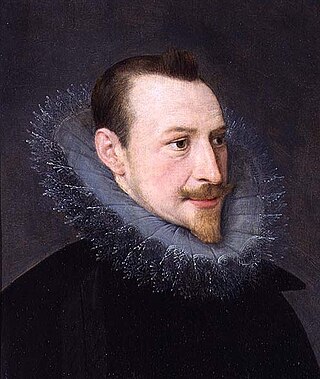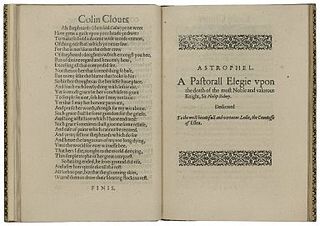
Edmund Spenser was an English poet best known for The Faerie Queene, an epic poem and fantastical allegory celebrating the Tudor dynasty and Elizabeth I. He is recognized as one of the premier craftsmen of nascent Modern English verse and is often considered one of the greatest poets in the English language.

Scottish literature is literature written in Scotland or by Scottish writers. It includes works in English, Scottish Gaelic, Scots, Brythonic, French, Latin, Norn or other languages written within the modern boundaries of Scotland.

The culture of Scotland refers to the patterns of human activity and symbolism associated with Scotland and the Scottish people. The Scottish flag is blue with a white saltire, and represents the cross of Saint Andrew.
Philip Dennis Hobsbaum was a British teacher, poet and critic.
Tom Leonard was a Scottish poet, writer and critic. He was best known for his poems written in Glaswegian dialect, particularly his Six Glasgow Poems and The Six O'Clock News. His work frequently dealt with the relationship between language, class and culture.

William Patrick Maley was an Irish-born Scottish international football player and manager. He was the first manager of Celtic Football Club, and one of the most successful managers in Scottish football history. During his managerial tenure, Maley led Celtic to thirty major trophies in forty-three consecutive years as manager. He is attributed to have coined the famous Celtic motto 'It is not his creed nor his nationality which counts, it's the man himself.'

James Kelman is a Scottish novelist, short story writer, playwright and essayist. His fiction and short stores feature accounts of internal mental processes of usually, but not exclusively, working class narrators and their labyrinthine struggles with authority or social interactions, mostly set in his home city of Glasgow. Frequently employing stream of consciousness experimentation, Kelman's stories typically feature "an atmosphere of gnarling paranoia, imprisoned minimalism, the boredom of survival.".

Possilpark is a district in the Scottish city of Glasgow, situated north of the River Clyde and centred around Saracen Street. The area developed around Saracen Foundry of Walter MacFarlane & Co., which was the main employer. In the wake of the Saracen Foundry's closure in 1967, this part of Glasgow became one of the poorest in the United Kingdom, and decades later deprivation and crime rates remain high.
Glasgow University Shinty Club is a shinty club from Glasgow, Scotland. Although formally a University Shinty team, representing the University of Glasgow, it has a long history of competition in national competition.
Nationality words link to articles with information on the nation's poetry or literature.
Roderick Watson is a Scottish poet. He is a professor emeritus in English Studies at the University of Stirling.
Derek Attridge FBA is a South African-born British academic in the field of English literature. He is Emeritus Professor of English and Related Literature at the University of York, having retired from the university in 2016, and is a Fellow of the British Academy. Attridge undertakes research in South African literature, James Joyce, modern fiction, deconstruction and literary theory and the history and performance of poetry. He is the author or editor of thirty books, and has published eighty articles in essay collections and a similar number in journals. He has held a Guggenheim Fellowship and a Leverhulme Research Professorship, and Fellowships at the National Humanities Center, the Bogliasco Foundation, the Camargo Foundation, and The Stellenbosch Institute for Advanced Study, the Freiburg Institute for Advanced Studies, and All Souls and St. Catherine's Colleges, Oxford. Among the visiting positions he has held have been professorships at the American University of Cairo, the University of Sassari, the University of Cape Town, Northwestern University, Wellesley College, and the University of Queensland.
Tom Hubbard was the first librarian of the Scottish Poetry Library and is the author, editor or co-editor of over thirty academic and literary works.
Philip Schwyzer is an American-British literary scholar and author, who since 2001 has been Professor of Renaissance Literature at Exeter University.

Murray G. H. Pittock MAE FRSE is a Scottish historian, Bradley Professor of Literature at the University of Glasgow and Pro Vice Principal at the University, where he has served in senior roles including Dean and Vice Principal since 2008. He led for the University on the University/City of Glasgow/National Library of Scotland Kelvin Hall development (kelvinhall.org.uk), and has chaired Glasgow's unique early career development programme, which has been highly influential in the sector, since 2016. He has also acted as lead or co-lead for a range of national and International partnerships, including with the Smithsonian Institution, and plays a leading role in the University's engagement with government and the cultural and creative industries (CCIs), organizing the 'Glasgow and Dublin: Creative Cities' summit in the British Embassy in Dublin in 2019, and working with the European network CIVIS on the creation of a European policy document on universities and civic engagement, on which he gave a masterclass for La Sapienza University He also produced a major report on the impact of Robert Burns on the Scottish Economy for the Scottish Government in 2020; a Parliamentary debate was held at Holyrood on the recommendations, which have been cited in policy debate many times since. In 2022, he was declared Scotland's Knowledge Exchange Champion of the year. Outside the University, he served on the Research Excellence Framework (REF) Institutional Environment Pilot Panel in 2018-22, and on the National Trust for Scotland Board (2019-27) and Investment Committee, as well as acting as Co-chair of the Scottish Arts and Humanities Alliance (SAHA) and chair of the Governance Board of the Scottish Council on Global Affairs. He also serves as Scottish History Adviser to the NTS and as an adviser to a wide range of other national heritage bodies and the Scottish Parliament; recently he has provided expert advice to both the Scottish and British parliaments on promoting Scotland abroad. He is on the Advisory Board of NISE, the Europe-wide research group bringing together over 40 research centres working on national identities and was President of the Edinburgh Walter Scott Club in 2019-20 and 2021-22. He has given a number of major lectures, most recently the Magnusson, MacCormack and Caledonian lectures
Alastair David Shaw Fowler CBE FBA was a Scottish literary critic, editor, and an authority on Edmund Spenser, Renaissance literature, genre theory, and numerology.
William Lindsay Renwick was Professor of English Literature at Durham University from 1921 to 1945 and Regius Professor of Rhetoric and English Literature at the University of Edinburgh from 1945 to 1959.

Astrophel: A Pastorall Elegy upon the Death of the Most Noble and Valorous Knight, Sir Philip Sidney is a poem by the English poet Edmund Spenser. It is Spenser's tribute to the memory of Sir Philip Sidney, who had died in 1586, and was dedicated "To the most beautiful and vertuous Ladie, the Countesse of Essex", Frances Walsingham, Sidney's widow.

Patrick Gerard Cheney is an American scholar of English Renaissance Literature. He is Edwin Erle Sparks Professor of English and Comparative Literature at the Pennsylvania State University.

Elizabeth Catherine "Ella" Carmichael, also known after 1906 as Mrs. W. J. Watson, was a Scottish editor and scholar, remembered as a supporter of the Scottish Gaelic language.









